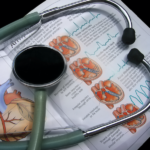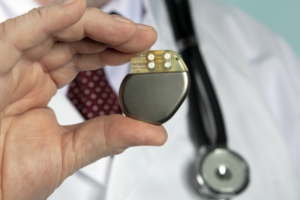 A pacemaker can save your life, but it is also sure to alter it as well.
A pacemaker can save your life, but it is also sure to alter it as well.
Pacemakers have been designed to help your heart beat and control the rhythm, doing so in a way that is almost unnoticeable by the patient, it is important to remember that a pacemaker is still just an electronic device.
Pacemakers were designed to withstand the wear and tear that results from most normal activities.
This means that if you loved to exercise frequently or play sports before your pacemaker was inserted, you will most likely be able to continue normally, pending any specific recommendations from your physician. While strenuous activities are okay, including most contact sports, if you’re an avid hunter and use a rifle for hunting purposes you will need to rest the rifle on the shoulder that doesn’t have the device in order to avoid the full recoil of the rifle hitting the device. Also, any activity that involves significant repetitive shaking (e.g. using a jackhammer) you will need to avoid as well.
Be aware that having a pacemaker will require you to check in with your physician frequently, usually up to several times per year. Like any electronic device, pacemakers are subject to damage and susceptible to failure over time, so your physician will likely want to examine you about every 3 months to check for any issues. Your physician will also want to examine your heart and the further progression of your heart disease, in order to determine whether the pacemaker is still an effective and appropriate option for you. Because of the advancements in medical technology in recent years, depending on the type of pacemaker you have and if no in-person examination is required, your physician may be able to simply tap into your pacemaker’s functions remotely and check in on you periodically that way.
You’ll need to avoid exposure to any electronics that have strong magnetic fields, such as MRI machines. However, going through metal detectors at the airport or standing by electrical generators will not have any effect on the device. Also, small devices such as MP3 players and cell phones can be safely placed in your front shirt pocket directly over your heart without any concerns for disrupting the function of the device.
No pacemaker will last a lifetime. Depending on the activity level of the patient, as well as a variety of other external and internal factors, the average pacemaker will last 6 or 7 years, though they can last as few as 5 years and as many as 15 years.
How long a pacemaker lasts is generally dependent on the following factors:
- The severity of the heart disease and the speed of its progression.
- The overall age of the battery, as all pacemakers will grow weaker over time.
- Whether the device has experienced any damage.
- How much exposure the device has received to potentially disruptive electrical signals.
Part of the reason why it is so important to check in with your physician frequently is so that they can take note of exactly when your pacemaker’s battery begins to weaken or fail and replace it before any problems occur. Fortunately, the surgery involved in replacing a pacemaker generator or battery is much less involved than the original surgery to insert it, and patients typically recover, resume normal activities and are discharged from the hospital the same day.
Please check with your personal physician when determining the best lifestyle choices for you. If you are in the Tampa area and have any questions or concerns regarding pacemakers and ongoing care, schedule an appointment with the physicians at Tampa Cardiovascular Associates today by calling (813) 975-2800.
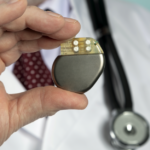
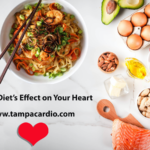
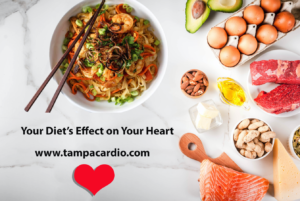 How much thought do you really give to what you are feeding your body? Many of us don’t give all that much thought. We buy food based on the fact that we enjoy it. The problem is that many of the foods we love the taste of do not contain the nutrients our bodies need in order to function.
How much thought do you really give to what you are feeding your body? Many of us don’t give all that much thought. We buy food based on the fact that we enjoy it. The problem is that many of the foods we love the taste of do not contain the nutrients our bodies need in order to function.
 If you are dealing with varicose veins you will want to see a qualified Vein Specialist for a proper diagnosis in order to know what your best options are for treatment.
If you are dealing with varicose veins you will want to see a qualified Vein Specialist for a proper diagnosis in order to know what your best options are for treatment. 